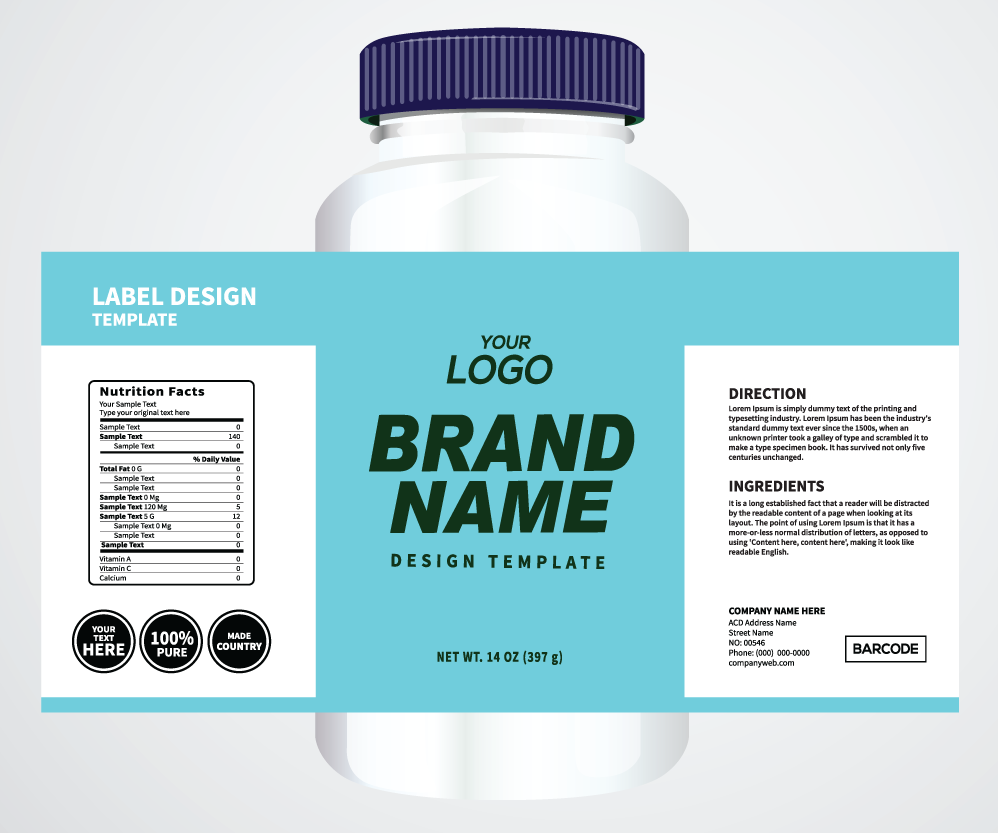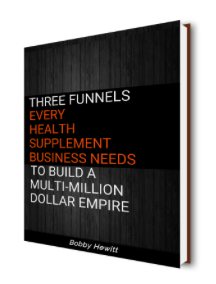Most people think supplement branding is the name of their company or their product.
Others think branding is the look of their logo, the bottle design or the look and feel of the website.
But branding is actually much more than that.
David Aaker, author of Building Strong Brands, defines a brand as…
“A set of expectations, memories, stories and relationships that, taken together, account for a consumer’s decision to choose one product or service over another.”
Branding is closer to the customer experience than a logo.
However it’s not entirely based on customer experience.
Remember, as David Aaker defines brand, it’s also made up of expectations and memories.
If the customer has never bought from you before, they have no expectations or memories with your brand.
But, they do have expectations and memories with the product category of dietary supplement brands.
Those past experiences touch on trust and belief, two core principles of our proprietary framework.
Customers come to your sales page with preconceived ideas about the supplement industry.
Knowledge of their problem and possibly even knowledge of some of the ingredients in your product.
They talk to friends, family and do online research before they stumble across your brand.
All that baggage comes with them and contributes to the make up of your supplement brand.
Everyone is at a different stage of awareness in the marketplace.
Can you see how your vitamin brand is actually much more that the look and feel?
The best supplement branding has nothing to do with your bottle design
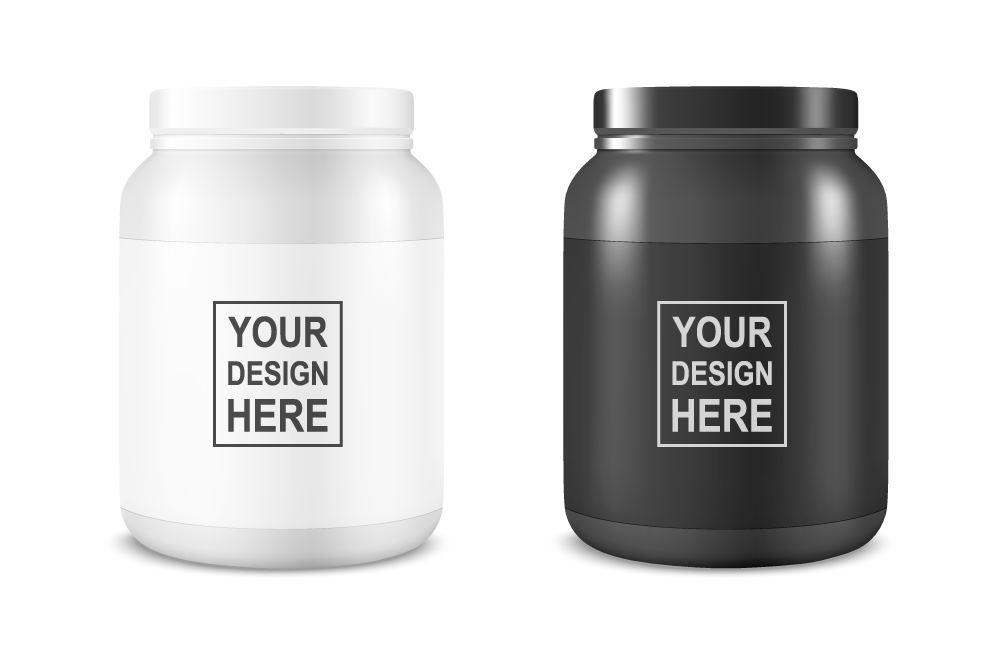
Defining your supplement brand identity should not start with a logo or bottle design. Those things have such a minor contribution when it comes to moving the needle.
If we go back to Aaker’s definition, the best supplement brands put less importance on the look and more on the expectations, memories, stories and relationships that you create.
After the sale, people may forget what your marketing copy said. But they will never forget how your supplement makes them feel.
How the specific ingredients in your supplement interacts with their body and makes them physically feel.
As well as how they feel about themselves or want to feel about themselves. Because people like us take supplements like these.
Yet everything that comes before being introduced to your vitamin brand matters.
Including all preconceived expectations and any existing baggage around their state of awareness.
These are the factors that influence how a consumer makes their decision to choose one supplement over another. Not the look of your bottle, website or logo.
You want to stand out, because your supplement brand is competing in a sea of sameness.
But you don’t know how, so you focus on how things look.
That’s why, when it comes to vitamin brands, it’s more important to be different than it is to be pretty.
There are plenty of very pretty supplement brands out there already.
Just take a look at the vitamin brand Ritual…
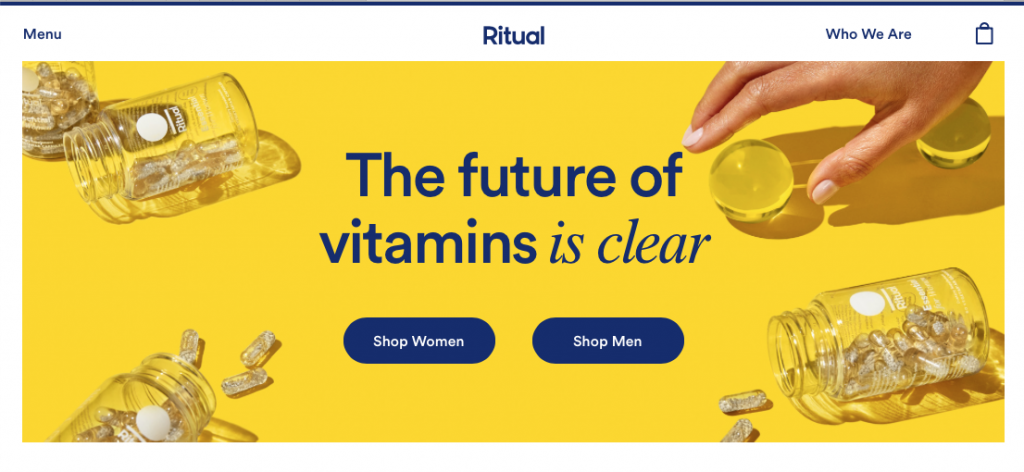
and the vitamin brand Elysium…
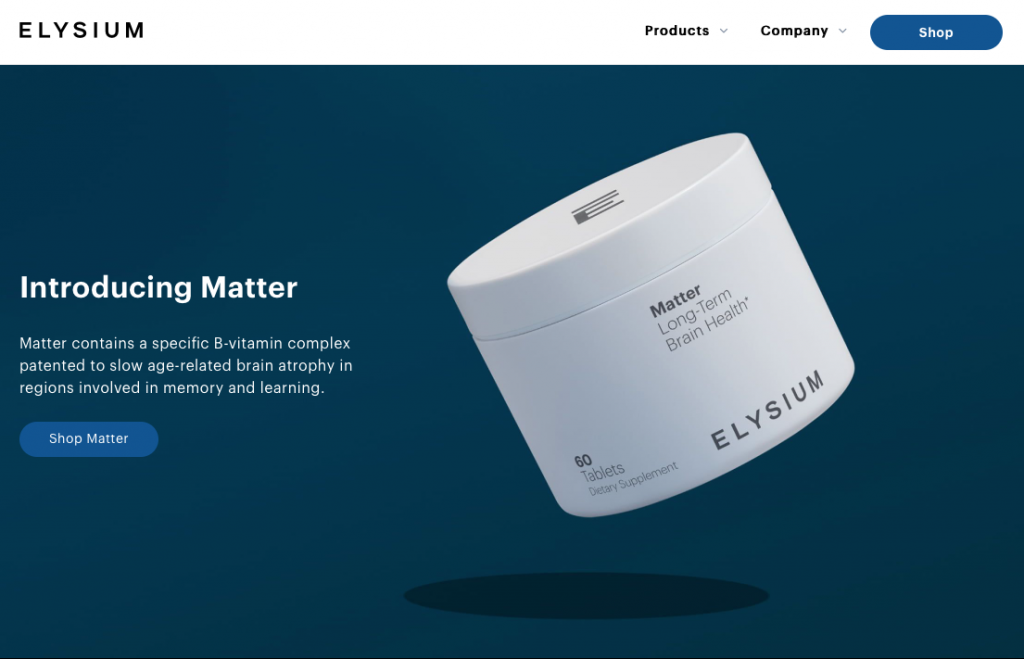
Or the brand Lyma just to name a few…
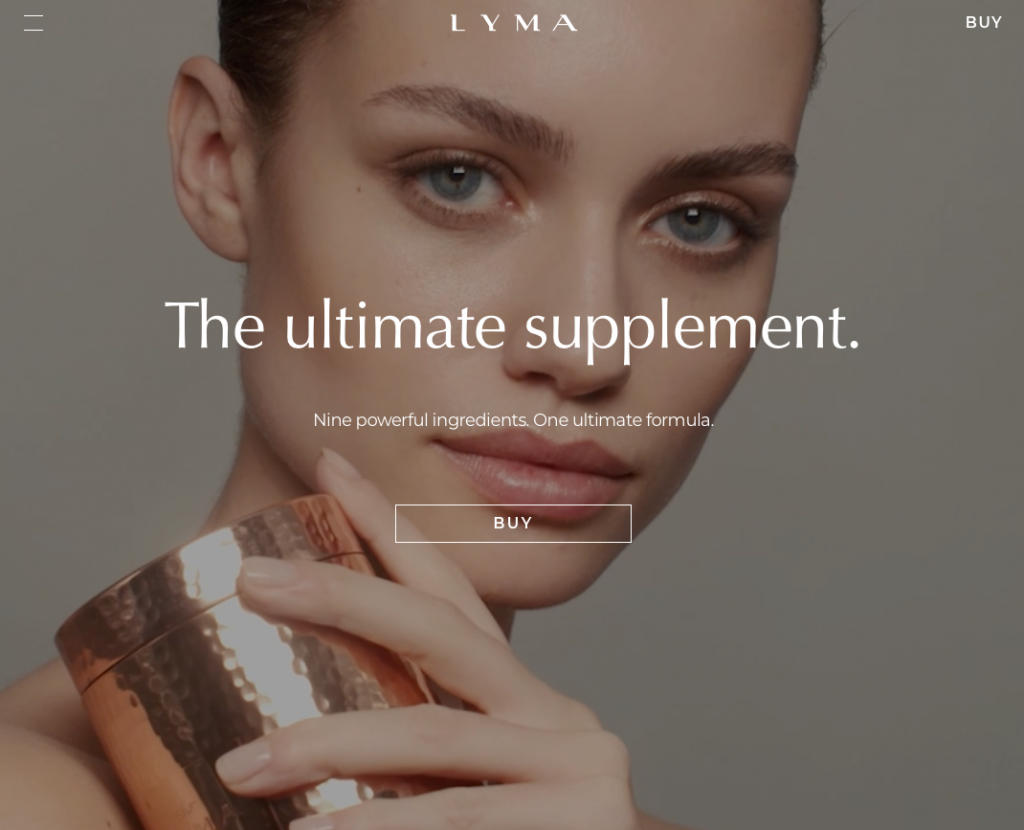
A good looking supplement bottle is just the table stakes to play in the market today.
A great looking vitamin bottle won’t move the needle when it comes to sales.
To the end customer there’s no difference between a great looking vitamin brand bottle and a good looking one.
Remember, a strong supplement brand is about the expectations, memories, stories and relationships that you create not how cool the bottle looks.
We satisfy our egos by focusing on the look of the packaging. But to the end customer it does not make a difference.
When it comes to buying a dietary supplement, it’s about the hope of what it’s going to do for them not the vitamin branding look and feel.
All of the evidence from our research and A/B testing in the health supplement space supports this hypothesis and can be summed up in our thesis statement…
People don’t buy supplement brands the way they buy other products.
In the dietary supplement market, brand stories are where your difference can shine, not your brand identity.
Which is why it’s important to…
Establish a point of difference for your vitamin brand

In the dietary supplement industry, there are a million different types of products.
Everything from a bottle of capsules, a drink mix, gummies and more.
But from the buyers perspective most of the options, just like the bottles, look the same.
They have the same ingredients that help support inflammation or immunity or heart health or whatever it is you’re targeting.
They are in the same category mind space of the prospect.
Swallow this, drink this, chew this, rub this on.
In the end it’s not much different to the customer. It all comes down to ingesting something.
Virtually all supplements promise or imply the same results (within each individual disease state) for the prospect.
The promise of more mobility, a healthier heart, less brain fog, better digestion. The promises go on, and on, and on.
For the customer, it’s all a sea of sameness.
And it leaves the prospect feeling confused.
Confusion leads people to not take action.
It’s simply human nature. When someone is confused, they don’t buy.
They leave your sales page and move on.
Your point of difference is what drives the prospect’s hope.
It’s how you stand out as a supplement brand today.
Not by your unique brand identity design but by the combination of your unique mechanism and the future state your customers are striving towards.
A unique mechanism is your vitamin brands special sauce. It’s not so much a specific ingredient. Because any supplement brand can use virtually the same ingredients.
But rather it’s the story of how those ingredients work in the body.
A future state happens in your prospects imagination. It’s a point in the future. That helps your audience visualize a new future. It works especially well, when combined with storytelling.
Here’s an example:
First, acknowledge where they are right now.
Look, it’s not easy to live with high blood pressure.
You’re a prime target for some of the worst drugs in Big Pharma’s arsenal.
In fact, blood pressure drugs, including beta blockers, calcium blockers and more are on our list of the Most Dangerous Prescription Drugs.
Mainstream medicine prescribes blood pressure drugs by the bucket load, and they are notorious for nasty side effects… including dizziness, bleeding gums, severe gastrointestinal problems, fatigue, insomnia, impotence, depression… and worse.
One minute you’re reaching into your medicine cabinet for your doctor prescribed daily dose. The next minute, the paramedics are rushing you to the hospital… your loved ones left alone in total shock.
Second, take your supplement buyer to a specific event in the future where they are benefiting from the effects of your supplement brand.
Here’s another example:
Imagine, 5 days from today and your package of (insert your supplement brand here) has just arrived. You open the box. Crack open the fresh tamper proof seal and take your first capsule. You read over all of the bonus material that comes in the box and know that you’ve taken an important step toward your health.
Next, imagine, it’s a week from now. You are using (insert your supplement brand here) everyday. It’s become part of your morning routine along with breakfast. You feel different. You feel better. Adding (insert your supplement brand here) to your morning is your first accomplishment of the day.
Now it’s a few months from now. The ingredients of (insert your supplement brand here) have built up in your body and have gone to work every single day making a difference. You’re more active and your whole outlook on life is better. Because you know you’re taking care of your health.
Finally, after you take your prospect to the future and have them experience the hope of the future, you have to acknowledge them for getting there even if it is only in their imagination.
Here are some more examples:
If you were able to just reduce your joint pain by 10% that would be a big accomplishment for you.
Imagine springing out of bed int he morning pain-free. Imagine going about your life, engaging in the activities you love… without taking a week or more to recover!
The best part? This alternative works naturally to relieve arthritis pain, without dangerous side effects. Let me explain…
Or…
Imagine going from diabetic to compleatly healthy in just three months. It can happen for you, just take a look at this ground breaking double blind study.
Or…
Imagine the relief of having your memory back to full capacity.
Of being able to think and reason clearly.
To solve problems, remember events and carry out daily tasks like paying bills.
Okay…
Those are just a few examples of how to position that part of the brand story. You’ll have to make your own decisions how far you push the line here.
But don’t be afraid to rock the boat a bit on certain marketing channels. Remember, different is how your vitamin brand wins. If your competitors are afraid to push the line that’s an opportunity for your brand to stand out.
Now let’s get into how to do that a bit more.
How to define the uniqueness of your supplement brand
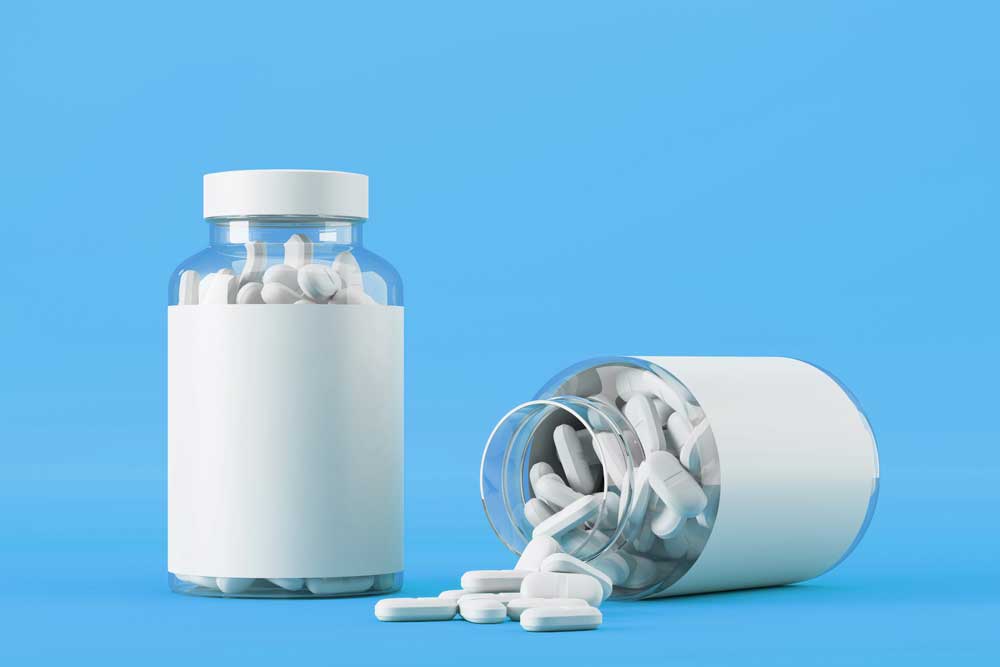
Every brand stands for something. When you stand for something, you must, by definition, stand against something else.
So what dragon are you slaying?
This is the question every supplement brand must answer.
Most supplements are slaying the dragon of BIG Pharma and dangerous chemical side effects.
But how you slay that dragon is how you’re different.
To do that, you’ll want to first tap into the existing values of your target market.
If you’re going after patriots like Patriot Greens then all of your messaging needs to resonate with people that vigorously support their country.
Next, align with their existing beliefs.
This requires knowing what they believe about your product. Again going back to stories that already exist in their heads about themselves more so than your supplement brand.
But also in the case fo Patriot Greens, what they believe about being a patriot.
Then create rituals.
Bulletproof coffee did this by tapping into an existing ritual, drinking coffee. They just added putting butter in it.
Finally spread the word through all marketing channels.
Supplement branding trends that are emerging

Building a supplement brand with a point of difference that goes beyond the look of your bottle is a must to succeed in today’s vitamin and supplement marketplace.
Yet there are a few vitamin brands out there that in our opinion have put too much of the future of their success on the look of the capsule.
With the trend of cool capsules.
One such brand is Ritual. With their translucent capsule, so you can actually see the ingredients floating around inside.
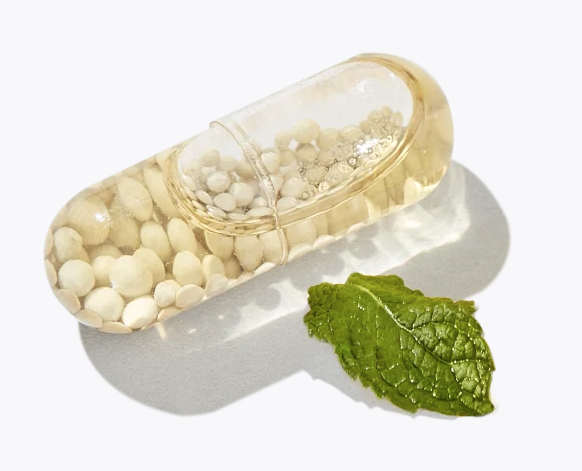
Another is Lyma, that puts their logo on each capsule.
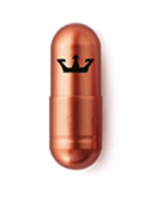
No question these are cheap gimmicks, that look cool.
Moreover, they likely increase the cost of these supplements, that the customer is paying for.
But the truth is, that people don’t swallow vitamins because they look cool.
I hope this trend does not continue as it does not move the needle.
In my opinion, these are attempts to capture the elusive millennial supplement buyers.
The future of selling a dietary supplement brand is going to be greatly impacted by millennials.
Millennials want to enter into a relationship with a brand they believe in.
Being authentic and transparent is vital to brand building with them.
Not a logo on a capsule or a bottle of pills that comes in a bronze vessel, even if it is sold at Neiman Marcus and Saks Fifth Avenue. (Sorry Lyma.)
Being authentic and transparent goes far beyond just your ingredients and unique mechanism.
The trend of authenticity goes beyond your founder’s story.
If your employees and customers are not expressing their love for your product with selfies and social media, you’re not being as genuine as you can be with millennials.
Millennials are buying into the culture more than the product.
Which goes back to establishing your brand’s point of difference.
The trend of surprise bonuses fit’s perfectly in the nook of being different and authentic at the same time.
Plus it has the persuasion tool of reciprocity built right in.
For example I recently signed up for a monthly subscription to a kids probiotic for my daughter from the supplement company Jetson.
After the second recurring box showed up they sent me an email with an unexpected surprise.
In my next shipment they were going to send me a bottle of their adult probiotic for free.
You bet that meant I stuck around for an additional month, even though I was planning on canceling at month 2 because my daughter wasn’t liking the taste.
Then after buying a bottle of “Relax” from the vitamin company Weyland off of Amazon a few times.
I was surprised again.
Yes with a free bottle out of nowhere.
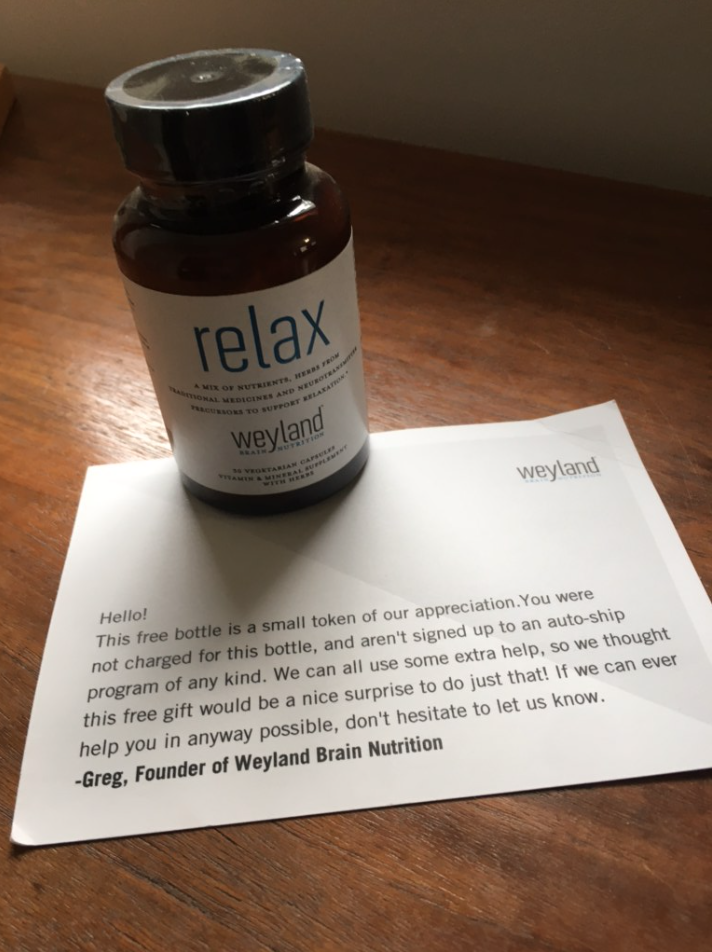
Was it totally unexpected? Yes.
Both these examples make for an unexpected memory about their vitamin brands but the same thing can also be accomplished with a simple curtesy call after your first order, just to see if they have your address correct, no up-selling.
It’s the little things like reciprocity that make a good supplement brand in today’s world of misinformation and distrust.
The trend of customization has been gaining traction for a while now.
Customers, and especially millennials, are looking past a one-size-fits-all approach.
Many vitamin brands like, Care Of, Persona Nutrition and Get Vitamin Lab, just to name a few are coming up with customized packs rather than one bottle for everyone.
Personalization can help increase trust.
Because your customers believe that everyone is different. And in the end it makes for a better experience.
The day’s of multivitamins, specifically for women over 50, are dying a slow death.
Supplement branding at it’s best is hard to pull off

It’s not as easy as a cool looking bottle, website or capsule.
That won’t move the needle. And is mostly a waste of money.
Every vitamin company should shift their branding from looking better than the competition to earning customer trust.
Not on Instagrammable packaging.
Traditional branding tactics are just a small part of who you authentically are.
More time and effort needs to be refocused on stories and experiences if you want your vitamin branding to stand out in todays world.
Discover the 3 funnels that can help your health supplement business succeed.
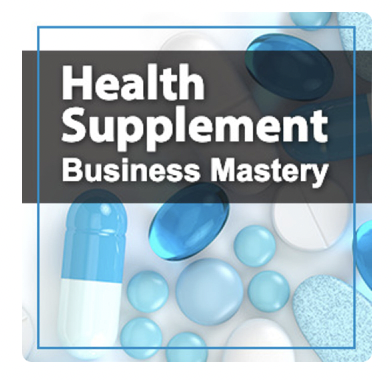
Listen to the Health Supplement Business Mastery Podcast for for dietary supplement entrepreneurs and marketers.
